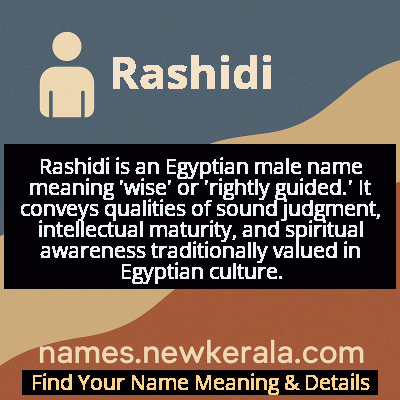Rashidi Name Meaning & Details
Origin, Popularity, Numerology Analysis & Name Meaning of Rashidi
Discover the origin, meaning, and cultural significance of the name RASHIDI. Delve into its historical roots and explore the lasting impact it has had on communities and traditions.
Name
Rashidi
Gender
Male
Origin
Egyptian
Lucky Number
5
Meaning of the Name - Rashidi
Rashidi is an Egyptian male name meaning 'wise' or 'rightly guided.' It conveys qualities of sound judgment, intellectual maturity, and spiritual awareness traditionally valued in Egyptian culture.
Rashidi - Complete Numerology Analysis
Your Numerology Number
Based on Pythagorean Numerology System
Ruling Planet
Mercury
Positive Nature
Adventurous, dynamic, curious, and social.
Negative Traits
Restless, impatient, inconsistent, prone to indulgence.
Lucky Colours
Green, white.
Lucky Days
Wednesday.
Lucky Stones
Emerald.
Harmony Numbers
1, 3, 9.
Best Suited Professions
Sales, marketing, travel, entertainment.
What People Like About You
Versatility, charisma, adventurous spirit.
Famous People Named Rashidi
Rashidi Yekini
Professional Footballer
Scored Nigeria's first World Cup goal and won African Footballer of the Year
Rashidi Kawawa
Politician
Served as Prime Minister of Tanzania and key figure in East African politics
Rashidi Adewale Ladoja
Politician/Businessman
Former Governor of Oyo State and influential Nigerian business leader
Rashidi Williams
Musician
Innovative jazz composer blending African and Western musical traditions
Name Variations & International Equivalents
Click on blue names to explore their detailed meanings. Gray names with will be available soon.
Cultural & Historical Significance
The name's prevalence in Egypt reflects the country's strong Islamic heritage and the importance placed on spiritual guidance and intellectual maturity in traditional Egyptian society. During the colonial and post-colonial periods, the name Rashidi became associated with educated elites and political leaders who navigated complex social transformations. Today, it continues to represent a connection to Islamic values while adapting to modern Egyptian identity, serving as a bridge between traditional wisdom and contemporary leadership.
Extended Personality Analysis
Individuals named Rashidi are typically perceived as thoughtful, analytical, and possessing natural leadership qualities. They tend to be methodical in their approach to problem-solving and often demonstrate exceptional judgment in difficult situations. Their wisdom is not merely intellectual but practical, enabling them to navigate complex social and professional environments with grace and effectiveness. Rashidis are often sought out for advice and counsel, as they combine emotional intelligence with logical reasoning.
These individuals typically exhibit patience, foresight, and a calm demeanor even under pressure, making them reliable anchors in their families and communities. While they may appear reserved initially, they possess deep empathy and strong moral convictions that guide their interactions and decisions. The name suggests someone who learns from experience rather than rushing to conclusions, and who values knowledge that has been tested through practical application. This combination of intellectual depth and emotional stability often makes Rashidis successful in leadership roles where balanced judgment is essential.
Modern Usage & Popularity
In contemporary times, Rashidi remains a popular choice among Egyptian and broader African Muslim communities, though its usage has become more selective compared to more common Arabic names. While not among the top-ranking names in birth registries, it maintains steady popularity among families valuing traditional Islamic names with deep philosophical meaning. The name has gained international recognition through diaspora communities in Europe and North America, where it serves as a marker of cultural heritage. Modern parents often choose Rashidi for its combination of traditional roots and the contemporary relevance of its 'wisdom' meaning, particularly in an era that values intelligence, emotional quotient, and ethical leadership. The name continues to be associated with educational achievement and is frequently found among professionals in law, academia, and community leadership.
Symbolic & Spiritual Meanings
Symbolically, Rashidi represents the journey toward enlightenment and proper guidance in both spiritual and worldly matters. It embodies the ideal of following the 'right path' - a concept deeply rooted in Islamic philosophy where spiritual and ethical correctness are paramount. The name carries connotations of moral compass, intellectual clarity, and spiritual awareness that guides not only the individual but also those around them. In metaphorical terms, it suggests a beacon or lighthouse - someone who illuminates the way for others through accumulated wisdom and lived experience. This symbolism extends to concepts of maturity and transformation, where rash decisions are replaced by considered judgment, and knowledge evolves into practical wisdom that benefits the wider community. The name ultimately represents the harmonious integration of learning, experience, and ethical principles.

